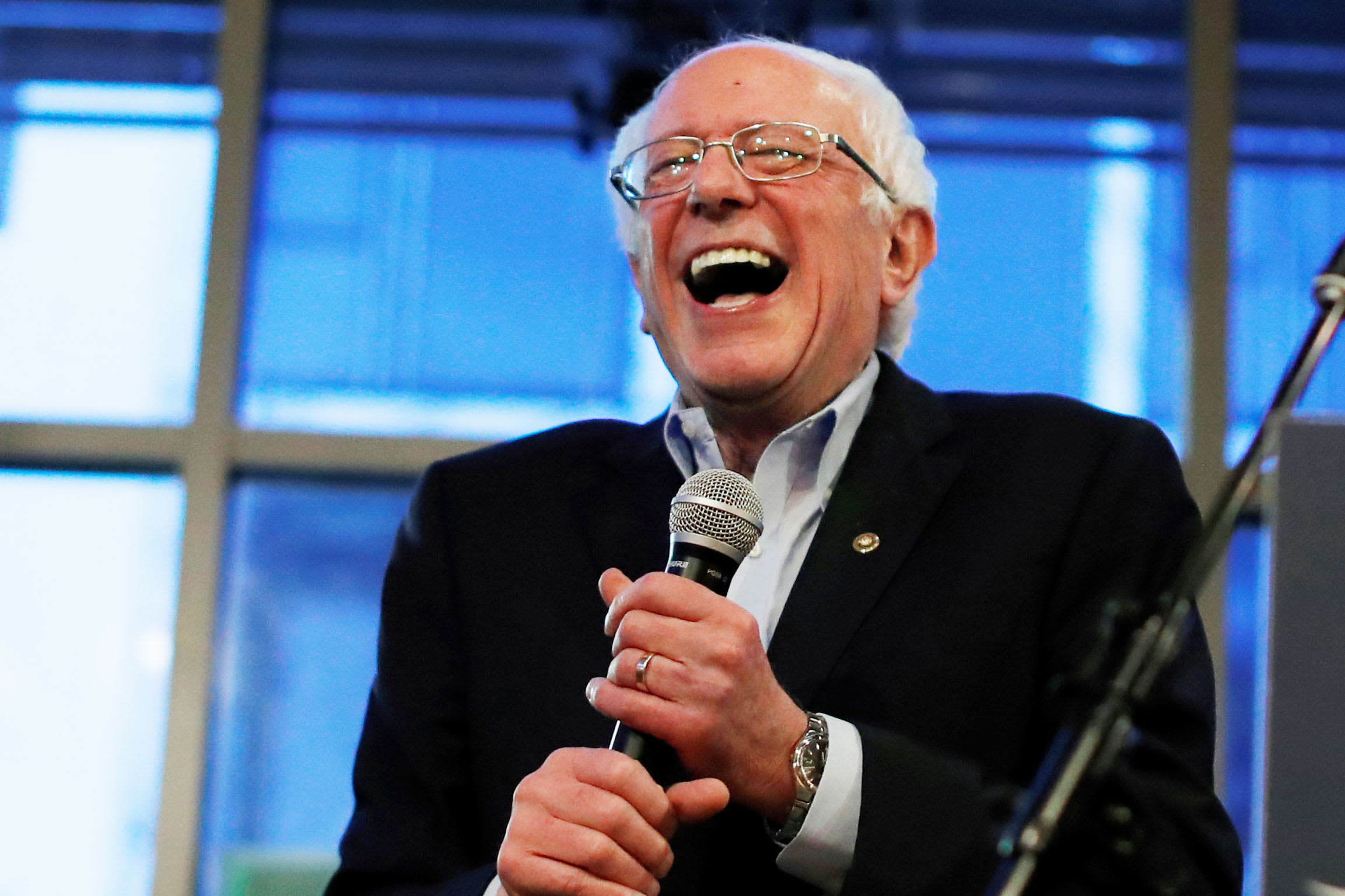
Democratic U.S. presidential candidate Senator Bernie Sanders laughs as he addresses supporters during a campaign stop at a coffee chop in Iowa City, Iowa, February 1, 2020.
Mike Segar | Reuters
WASHINGTON — Bernie Sanders has opened up a double-digit lead nationally over his closest rivals in the Democratic presidential primary, where Michael Bloomberg’s rise appears to have scrambled the race, according to an NBC News/Wall Street Journal poll released Tuesday.
The Vermont senator has the support of 27% of Democratic primary voters, a figure which is unchanged from January, the survey found. Sanders’ unchanged support comes despite having won a decisive victory in New Hampshire’s first-in-the-nation primary last week, and an apparent win in Iowa’s chaotic caucuses the week before.
Below is a list of the NBC/WSJ results for support among likely Democratic primary voters, followed by the shift in support since the poll was last conducted in January.
- Sen. Bernie Sanders, I-Vt.: 27%, unchanged.
- Former Vice President Joe Biden: 15%, down 11 pts
- Former New York City Mayor Michael Bloomberg: 14%, up 5 pts
- Sen Elizabeth Warren, D-Mass.: 14%, down 1 pt
- Former South Bend, Indiana, Mayor Pete Buttigieg: 13%, up 6 pts
- Sen. Amy Klobuchar, D-Minn.: 7%, up 2 pts
- Tom Steyer: 2%, unchanged
- Rep. Tulsi Gabbard, D-Hawaii: 1%, down 1 pt
Twelve points behind Sanders is former Vice President Joe Biden, whose support in the poll has plummeted to 15% in the past month, down from a previous figure of 26%. Following closely behind Biden is the billionaire former mayor of New York City, with 14% support, tied with Sen. Elizabeth Warren, D-Mass.
During the past month, Bloomberg has climbed 5 points in the poll, a rise fueled in part by Bloomberg’s decision to spend more than $400 million on a barrage of national TV and internet ads. Warren’s support, meanwhile, has fallen 4 points nationally since December.
Behind Warren and Bloomberg, former South Bend, Indiana, Mayor Pete Buttigieg grew his national support to 13% in February, up 5 points from the previous NBC/WSJ poll.
Sen. Amy Klobuchar, D-Minn., billionaire Tom Steyer and Rep. Tulsi Gabbard, D-Hawaii, all trailed Buttigieg.
Sanders’ 12 point lead is well outside the 4.7 point margin of error of the new survey, which was conducted between Feb 14-17 on a sample size of 900 registered voters.
Preliminary analysis of the results indicates that the biggest beneficiaries of Biden’s tumbling numbers were Bloomberg and Buttigieg, both moderates who are working hard to offer voters an alternative to the stridently progressive message coming from Sanders.
Bloomberg will be making his first appearance on the Democratic primary debate stage this week in Nevada, despite the fact that his is not competing in the first four nominating states: Iowa, New Hampshire, Nevada and South Carolina.
Instead, Bloomberg has focused on Texas and other states that vote on Super Tuesday, March 3. His ads, however, appear to have made an impression: In January, 59% of poll respondents said they remember seeing an ad from Bloomberg on TV or social media.
The survey also measured comfort levels among voters with certain qualities in a presidential candidate for the first time this month. These include a candidate “who self-funds their campaign with hundreds of millions of dollars of their own money” and a candidate who “is a socialist.”
Among Democratic primary voters, just 16% said they would be “very uncomfortable” voting for a candidate who used his or her personal fortune to fund their campaign. Among registered voters of both parties, the survey found the same number, 16%, reported they would be “very uncomfortable” voting for a self-funded candidate.
But on the question of whether they would be comfortable voting for “a socialist,” the divide between Democratic primary voters and all registered voters was a stark one. Only 17% of Democratic primary voters said they would be “very uncomfortable” casting their ballot for a socialist.
But when interviewers posed the same question to all registered voters, not just Democrats, this “uncomfortable” number more than doubled, to 46% of respondents saying they’d be “very uncomfortable” voting for a socialist.
Sanders is a self-described democratic socialist, a position he describes as being primarily concerned with correcting economic inequality. And he is not technically a Democrat, he’s an independent senator who caucuses with Democrats.
If Sanders continues to dominate the Democratic primary field, these distinctions could begin to make a big difference in Sanders’ long-term prospects for the presidency.
— CNBC’s Jacob Pramuk contributed reporting.

